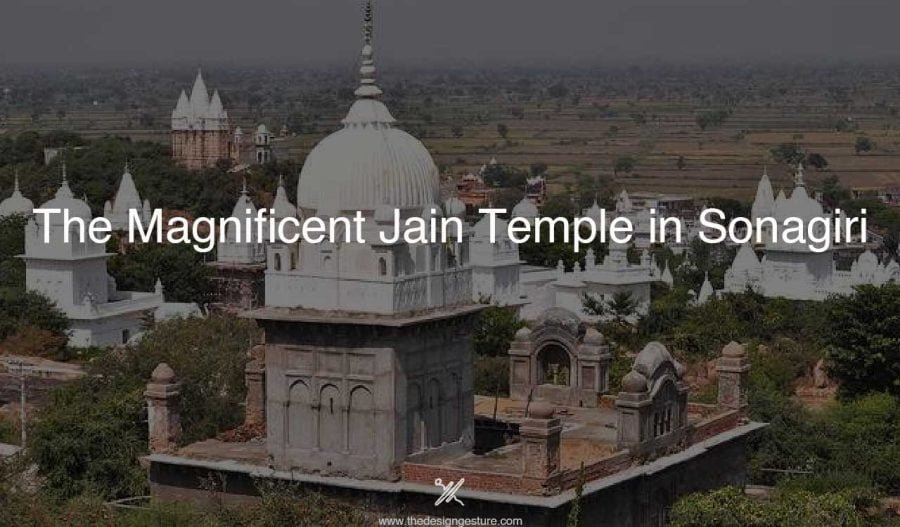Table of Contents
Introduction
Sonagiri Jain Temple is not only a symbol of spiritual devotion but also a reflection of architectural brilliance. With seventy-seven Jain temples nestled in the picturesque hills and twenty-six more in the village, Sonagiri offers a mesmerizing landscape.
In Hindi, the term “Sonagiri” translates to “a mountain (‘giri’) of gold (‘sona’).”
The main temple, housing an 11-foot-tall idol of Lord Chandraprabhu, along with other revered Jain deities, stands as a testament to spiritual devotion and architectural grandeur.
The 43-foot Manastambha (Tower of Glory) further adds to the temple’s allure.
Historical and Religious Significance of Jain Temple
Sonagiri has a lot of historical value because of the existence of multiple ancient Jain temples. Shri Digambar Jain Siddha Kshetra is a notable temple among others that make this location a popular Jain pilgrimage site. Because of the presence of multiple such temples, it retains religious significance from the 9th and 10th centuries. It grew in prominence as a sacred site for a huge number of devotees and ascetic saints to practice self-discipline and worship Gods according to Jain tradition.
In 1899, a woodcut engraving depicted the Jain Temples on Sonagiri Hill, a place of great reverence and significance in Jainism. Sonagiri is recognized as a Siddha-Kṣetra, holding a prominent position among Jain Tirthas, or pilgrimage sites. According to Jain scriptures, this sacred site has witnessed the attainment of moksha, or liberation, by an astounding five and a half crores of ascetic saints since the time of Chandraprabhu, the 8th Teerthankar. Devotees hold Sonagiri in deep veneration due to its spiritual sanctity.
The hill is adorned with 103 temples, with 77 gracing the hill itself and 26 nestled in the nearby village. Among the prominent features is a remarkable 3-meter (9.8 ft) rock-cut image of Chandraprabhu, dating back to the 5th to 6th century. Bhagwan Chandraprabhu’s divine presence in the form of the Samavsharan graced this place seventeen times, enhancing its spiritual aura. Legend has it that King Nanganang, accompanied by half a million followers, achieved moksha here, as did numerous other saints, including Nang, Anang, Chintagati, Poornachand, Ashoksen, Shridatta, Swarnbhadra, and many more, by Jain beliefs.
Sonagiri is a special and holy place called Laghu Sammed Shikhar, covering a large area of 132 acres that spreads across two hills. In the past, it also served as a Bhattaraka seat, but this role became defunct in the late twentieth century after the passing of Bhaṭṭāraka Candrabhūṣaṇa. It’s worth noting that several Bhattarakapada-sthāpnā manuscripts were also authored at this spiritually significant location.
The Temple Architecture
The Sonagiri Jain temple complex proudly features impressive Jain architectural designs. The primary temple, Temple No. 57, houses an impressive 11-foot-tall idol of Lord Chandraprabhu in a meditative posture. This temple is the centerpiece among 77 temples that grace the hills, while an additional 26 temples are scattered in the nearby villages. The temple’s beautiful pointed top is one of its special features, enhancing its overall architectural beauty.
The holy area also has statues of Lord Sheetalnath and Lord Parsvanath, providing a place of spiritual comfort for worshippers. Moreover, a towering 43-foot Manastambha (Column of Dignity) and a model of Samavsharan are integral parts of this sacred complex.
Laghu Sammed Shikar: A Spiritual Oasis
Nestled over an expansive area of 132 acres across two hills, Laghu Sammed Shikar at Sonagiri stands as a remarkable testament to Jain heritage.
A prominent white stone pillar outside the temple complex is adorned with intricate carvings and cenotaphs showcasing images of revered Jain Tirthankaras. Notably, Temple no. 60, known as “Pisan Hari ka Mandir,” has an intriguing history, as it was constructed by a humble woman grinding grains with a millstone. Temple no. 59, also known as the ‘Gumbajdwar,’ is notable for its minars on all sides.
Architectural Splendor Through the Ages
The Sonagiri Jain temple complex was constructed in the 9th and 10th centuries, showcasing the impressive architecture of that time. The main temple’s 11-foot-tall idol of Lord Chandraprabhu, along with its intricate sculptures and a white stone pillar, showcases the artistry of the time. Additionally, the awe-inspiring Shatrunjaya Mountain, adorned with over 900 temples, offers a pilgrimage journey of 3.5 kilometers and 3500 steps.
These temples are divided into sections and feature detailed sculptures, gorgeous idols, and breathtaking paintings, enhancing the spiritual and aesthetic experience. Temple No. 59, known as ‘Gumbajdwar,’ is flanked by miners, and all 77 temples are characterized by their majestic spires, symbolizing architectural magnificence. The temple’s location amidst the hills not only offers a vast expanse but also a visually stunning setting.
Moreover, the Sonagiri Jain temple is famous for its fantastic architecture, especially the tall 43-foot Manastambha, which still captivates both visitors and pilgrims.
Temple Number 57 takes center stage as the main temple at this sacred site. It commands attention with its vast size and a captivatingly artistic spire that graces its apex. Within the temple’s hallowed confines, the primary deity is an imposing 11-foot (3.4 m) idol of Chandraprabha, affectionately known as Bade Baba. Flanking this central vedi are two altars, each adorned with idols of Sheetalnath and Parsvanatha.
The temple also has an impressive 43-foot (13 m) tall pillar, representing a symbol of respect, and a carefully made model of Samavasarana. Within the Samavasarana temple, an exquisite sculptural representation of Samavasarana stands prominently. This sculpture displays a detailed design at the bottom, held up by three circular levels that lead to a square building. At the heart of this sacred edifice resides a chaumukha, a four-faced image of a Jina.
This temple enjoys widespread popularity among devout Jain followers and has even received esteemed guests, including former U.S. President Bill Clinton and European presidents, who were drawn to its spiritual allure and significance.
Spiritual Practices and Pilgrimage
Sonagiri or Swarnagiri, is popular among Jain devotees and ascetic saints who seek Moksha (salvation or liberation) via self-discipline and austerity. This location also has a Jain Museum.
Many prominent and learned saints visit this sacred site to attain salvation. Moksha has always been the ultimate goal for Jain saints and pilgrims, and this temple provides the necessary peace and tranquility for meditation.
Annual Festival and Cultural Celebrations
At this location, a grand Ratha Yatra takes place following the celebration of Holi, commencing on Chaitra Pratipada and concluding on Rang Panchami.
Additionally, an annual ‘flag-hoisting’ ceremony is meticulously organized, during which the previous spire’s flag is reverently replaced with a radiant new golden-colored flag.
Moksha, which is the ultimate aim for Jain saints and pilgrims, is sought here, and this temple offers the calm and quiet needed for deep meditation.
Conclusion
The Sonagiri Jain Temple mixes deep faith with perfect building design. situated within mesmerizing hills, its historical and belief significance has lasted for ages, attracting innumerable worshippers and ascetic saints.
The way the religious place looks, especially Temple Number 57 and the tall 43-foot Manastambha, makes it more appealing.
Sonagiri Jain Temple, a real gem, captures the essence of Jain tradition, providing a very meaningful spiritual and cultural experience for those who visit.




